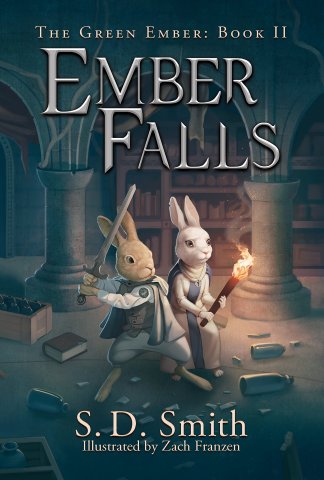I never fail to get a kick out of the way my mind has a mind of its own. There are things I know that I don't know I know, tucked away in the depths of those "little grey cells," waiting to be called forth, or more likely, to bubble up at random times, unbidden.
For example, there was the time I saw an interesting-looking butterfly flitting around the garden, and into my mind popped, "It's a gulf fritillary." I had no idea I knew what a gulf fritillary butterfly was, but I know I'd seen the identification before, having quite long ago made a book about butterflies for our grandchildren. It was there in my mind, somewhere, even though I could not have voluntarily recalled that information.
Then there was this, quite recently: I had just finished reading C. S. Lewis's Surprised by Joy, and when my eyes passed over the title of the book on our kitchen counter, my mind filled in, "Impatient as the wind." After a moment's wonder, I realized that I was quoting a poem, and my next thought—again unbidden—was, "It's probably Wordsworth." Which, I later confirmed, it is. I have no idea from what depths that knowledge was dredged, nor why, at this particular time and place, it came to me.
Surprised by joy—impatient as the Wind
I turned to share the transport—Oh! with whom
But Thee, long buried in the silent Tomb,
That spot which no vicissitude can find?
Love, faithful love, recalled thee to my mind—
But how could I forget thee?—Through what power,
Even for the least division of an hour,
Have I been so beguiled as to be blind
To my most grievous loss!—That thought’s return
Was the worst pang that sorrow ever bore,
Save one, one only, when I stood forlorn,
Knowing my heart’s best treasure was no more;
That neither present time, nor years unborn
Could to my sight that heavenly face restore.
I had been looking at the book and its title multiple times a day for several days, yet never once in those previous days had the poem come to mind.
I'm reminded, also, of the time early in her mathematical education, when our younger daughter cried out in frustration when I—dutiful teacher!—asked her to show her work, instead of just writing down the answer to the problem. "I can't show my work!" she exclaimed, "There is no 'work'—there is just the answer!"
I think we all know a lot more than we think we do—not everything we learned went in one ear and out the other. The problem is not so much knowledge as retrieval. It's all the more interesting to me because one of our grandchildren appears to have this undependable retrieval system under much better control than most of us: When he learns something, he knows it and he remembers it—at least a lot better than most of us do. How does that work?
And what other fascinating facts are there, sleeping in the recesses of my brain, that I know but don't know I know until they choose to reveal themselves?
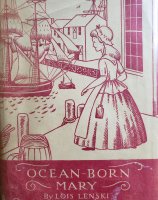 Ocean-Born Mary by Lois Lenski (J. B. Lippincott, 1939)
Ocean-Born Mary by Lois Lenski (J. B. Lippincott, 1939)
I grew up with Lois Lenski's Indian Captive, a fictionalized version of the story of Mary Jemison, captured by Indians during the French and Indian War. She remained with the Senecas all her life, and I have seen her grave in Letchworth State Park, one of our favorite spots in Western New York. It remains one of my favorite stories.
Many years later, after moving to Florida, I discovered the Newberry Award-winning Strawberry Girl, Lenski's novel about rural Florida in the early 20th century, and liked it also.
I wish Lenski's books weren't so hard to find. Recently I discovered a new one, in little Hillsboro, New Hampshire's tiny library: Ocean-Born Mary—and it's as good as the other two.
There's a reason this book is in a New Hampshire library: it is the fictionalized story of Mary Wilson Wallace, who was born on a ship that was part of the 18th century Scots-Irish immigration to New England. She grew up in New Hampshire, and her grave is in Henniker, the next town over from Hillsboro. Our New Hampshire grandchildren will want to be sure to read the Afterward, where they will find such familiar names as The Isles of Shoals and Star Island.
Warning: some spoilers below, but important for parents to read.
I loved Ocean-Born Mary. This is the world many of my ancestors lived in. Lenski has fictionalized the story and softened some of the harsh details for the juvenile audience, but there is great historical detail and it rings true. Written in 1939, it does not have 21st-century sensitivities, and modern parents may cringe at the casual references to "Negro slaves." But that was reality, and it's good for Northerners to realize what they would love to forget—that slavery was not exclusively a Southern sin. It was part of life at that time, as were smallpox and starvation, Indian attacks and British oppression.
Many modern parents may find even more objectionable the protagonist's friendship with an older man of very ill repute, and the fact that she sneaks away on several occasions to meet with him. Nothing untoward happens, and there is nothing at all romantic in the modern sense about the relationship. I've read many modern children's books that are infinitely worse in that dimension. Nonetheless, it may make modern parents queasy, which is why I'd suggest this book as a read-aloud, or that parents might at least read it themselves, first.
But I do recommend Ocean-Born Mary, highly. It's a gripping story, enjoyable to read, and I think it paints a good picture of colonial New England.
There's no doubt that video games and manipulating phones and tablets develop certain skills. But if we think all that button pushing and finger-swiping are improving manual dexterity, apparently it's not doing so in ways that still matter greatly—such as the skills needed by a surgeon.
Roger Kneebone, professor of surgical education at Imperial College, London, says young people have so little experience of craft skills that they struggle with anything practical. ... "It is a concern of mine and my scientific colleagues that whereas in the past you could make the assumption that students would leave school able to do certain practical things—cutting things out, making things—that is no longer the case," says Prof Kneebone.
Prof Kneebone says he has seen a decline in the manual dexterity of students over the past decade. ... Students have become "less competent and less confident" in using their hands, he says. ... "We have students who have very high exam grades but lack tactile general knowledge."
Such skills might once have been gained at school or at home, whether in cutting textiles, measuring ingredients, repairing something that's broken, learning woodwork or holding an instrument.
Is this something to be gravely concerned about, or will we simply turn surgery over to robots the way we have turned shifting the gears in our cars over to automatic transmissions?
C. S. Lewis wrote about peer orientation? Certainly not by that name.
But recently, as part of my C. S. Lewis retrospective, I came upon a passage in Mere Christianity that immediately brought to mind the epidemic of children taking their culture and direction from peers, rather than from parents or other adults, which has been going on in our society for at least three generations.
What Lewis was actually writing about was the central tenet of Christianity: what it is and what it is not.
The central Christian belief is that Christ's death has somehow put us right with God and given us a fresh start. Theories as to how it did that are another matter. A good many different theories have been held as to how it works; what all Christians are agreed on is that it does work.
As part of his explanation of one of those theories, Lewis likens God's work in us—enabling us to repent, reason, and love—to a teacher who helps a child learn to write by holding the child's hand and forming the letters with him. Later he writes [emphasis mine],
I have heard some people complain that if Jesus was God as well as man, then His sufferings and death lose all value in their eyes, "because it must have been so easy for Him." Others may (very rightly) rebuke the ingratitude and ungraciousness of this objection; what staggers me is the misunderstanding it betrays. In one sense, of course, those who make it are right. They have even understated their own case. The perfect submission, the perfect suffering, the perfect death were not only easier to Jesus because He was God, but were possible only because He was God. But surely that is a very odd reason for not accepting them? The teacher is able to form the letters for the child because the teacher is grown-up and knows how to write. That, of course, makes it easier for the teacher; and only because it is easier for him can he help the child. If [the child] rejected him because "it’s easy for grown-ups" and waited to learn writing from another child who could not write ... (and so had no "unfair" advantage), [the student] would not get on very quickly. If I am drowning in a rapid river, a man who still has one foot on the bank may give me a hand which saves my life. Ought I to shout back (between my gasps) "No, it’s not fair! You have an advantage! You’re keeping one foot on the bank"? That advantage—call it "unfair" if you like—is the only reason why he can be of any use to me. To what will you look for help if you will not look to that which is stronger than yourself?
Rejecting the help of those who are stronger than ourselves is what we have been doing for decades. We turn for help and advice—for the very shaping of our lives—to our peers, and we not only tolerate, but encourage, the same in our children. Unlike all generations before the 20th century, we do not acquire our culture from our parents, but from agemates who have no more experience, knowledge, and wisdom than we ourseves. We ignore history, throwing out all mankind has learned from the beginning of human life on earth, on the grounds that the benighted, ignorant savages that came before us have nothing to say to our modern world. The latest TED talk or Huffington Post article gets more respect and attention than the wisest writings of the past.
No wonder we're in a mess.
The year of 2018 may stand as the one in which I read the most books ever. Records were made to be broken, of course, but this year's effort was helped considerably by the completion of my project of reading my entire collection of books by Miss Read, which tend to be under 300 pages and easy reading. When I realized that I had tied my previous record before the end of September (73, set in 2015), the thought crossed my mind, "Wouldn't it be cool to reach 100 by the end of the year?" "Impossible," I told myself. Well, you know how I feel when someone says, "impossible," even it's myself to myself. So I set a goal of reaching a full century, without resorting to padding the list with books chosen merely for their brevity. I confess that the goal did change my reading habits somewhat, since after making that decision I put off any particularly lengthy books—such as my grandson's favorite Wheel of Time series with its 900 or so page average—until 2019.
The month with the fewest books read was January, no surprise since we were overseas part of the month, and that's when I read the first of the Wheel of Time books. I read the most books (14) in October. Once again I'm pleased with the mixture, though as I said it was pretty heavily weighted towards Miss Read. I enjoy these projects of binge-reading a particular author; I've also done Shakespeare, George MacDonald, and J. R. R. Tolkien. My current project is C. S. Lewis, which will weigh in very heavily next year, given that our home library alone contains 50 books by or about him.
Here's the alphabetical list; links are to reviews. Titles in bold I found particularly worthwhile. This chronological list has ratings and warnings as well.
- Affairs at Thrush Green by Miss Read
- American Terroir by Rowan Jacobsen
- At Home in Thrush Green by Miss Read
- Ballet Shoes by Noel Streatfeild
- Battles at Thrush Green by Miss Read
- The Bible (ESV - English Standard Version)
- The Big Burn by Timothy Egan
- The Birth of the United States: 1763 - 1816 by Isaac Asimov
- The Black Star of Kingston by S. D. Smith
- By the Shores of Silver Lake by Laura Ingalls Wilder
- C. S. Lewis: A Biography by Roger Lancelyn Green and Walter Hooper
- C. S. Lewis: Images of His World by Douglas Gilbert and Clyde S. Kilby
- Celebrations at Thrush Green by Miss Read
- Changes at Fairacre by Miss Read
- The Christmas Mouse by Miss Read
- Country Bunch by Miss Read
- Dancing Shoes by Noel Streatfeild
- The Dark Tower and Other Stories by C. S. Lewis
- Ember Falls by S. D. Smith
- Ember Rising by S. D. Smith
- Emily Davis by Miss Read
- The Excellence Habit by Vlad Zachary
- The Fairacre Festival by Miss Read
- Farewell to Fairacre by Miss Read
- Farmer Boy by Laura Ingalls Wilder
- Farther Afield by Miss Read
- The First Four Years by Laura Ingalls Wilder
- Force 10 from Navarone by Alistair MacLean
- Foster's War by Carolyn Reeder
- Fresh from the Country by Miss Read
- Friends at Thrush Green by Miss Read
- From a Northern Window by Ronald MacDonald
- George MacDonald: 365 Readings by C. S. Lewis
- George MacDonald's Fiction: A Twentieth-Century View by Richard Reis
- The Golden Door: The United States from 1865 to 1918 by Isaac Asimov
- Gossip from Thrush Green by Miss Read
- The Green Ember by S.D. Smith
- The Harmony Within: The Spiritual Vision of George MacDonald by Rolland Hein
- Heidi by Johanna Spyri
- Highest Duty by "Sully" Sullenberger
- The Howards of Caxley by Miss Read
- Invitation to Number Theory by Oystein Ore
- Killing Lincoln by Bill O'Reilly and Martin Dugard
- The Last Archer by S. D. Smith
- Leave Me Alone, I'm Reading by Maureen Corrigan
- The Letters of J. R. R. Tolkien edited by Humphrey Carpenter
- Life Essential: The Hope of the Gospel by George MacDonald, edited by Rolland Hein
- The Light in the Forest by Conrad Richter
- Lincoln's Last Days by Bill O'Reilly and Dwight Jon Zimmerman
- Little House in the Big Woods by Laura Ingalls Wilder
- Little House on the Prairie by Laura Ingalls Wilder
- Little Town on the Prairie by Laura Ingalls Wilder
- The Long Winter by Laura Ingalls Wilder
- The Lost Empress by Steve Robinson
- The Man Who Counted by Malba Tahan
- The Market Square by Miss Read
- Mindless Eating by Brian Wansink
- The Mindverse Chronicles by Anaya Roma (Diana Villafaña)
- Momo by Michael Ende
- Moonshiner's Son by Carolyn Reeder
- The Pilgrim's Regress by C. S. Lewis
- Mrs. Pringle of Fairacre by Miss Read
- Proving the Unseen by George MacDonald
- New Worlds to Conquer by Richard Halliburton
- News from Thrush Green by Miss Read
- Night Without End by Alistair MacLean
- No Holly for Miss Quinn by Miss Read
- Nobody Wants to Read Your Sh*t by Steven Pressfield
- On Stage, Please by Veronica Tennant
- On the Banks of Plum Creek by Laura Ingalls Wilder
- On the Way Home by Laura Ingalls Wilder and Rose Wilder Lane
- One Beautiful Dream by Jennifer Fulwiler
- Our Federal Union: The United States from 1816 to 1865 by Isaac Asimov
- Out of the Silent Planet by C. S. Lewis
- Outlaws of Time #1: The Legend of Sam Miracle by N. D. Wilson
- Outlaws of Time #2: The Song of Glory and Ghost by N. D. Wilson
- Outlaws of Time #3: The Last of the Lost Boys by N. D. Wilson
- A Peaceful Retirement by Miss Read
- Planet Narnia by Michael Ward
- The Problem of Pain by C. S. Lewis
- R & M (beta version) by MB
- Return to Thrush Green by Miss Read
- The School at Thrush Green by Miss Read
- Shades of Gray by Carolyn Reeder
- The Shaping of North America: From Earliest Times to 1763 by Isaac Asimov
- Sister Bernadette's Barking Dog by Kitty Burns Florey
- Spirits in Bondage by C. S. Lewis
- Summer in Fairacre by Miss Read
- Theatre Shoes by Noel Streatfeild
- These Happy Golden Years by Laura Ingalls Wilder
- Thrush Green by Miss Read
- Time Remembered by Miss Read
- Toby Tyler; or, Ten Weeks with a Circus by James Otis
- Tyler's Row by Miss Read
- Village Affairs by Miss Read
- Village Centenary by Miss Read
- The War of Art by Steven Pressfield
- What the Dog Saw by Malcolm Gladwell
- The Wheel of Time Book 1: The Eye of the World by Robert Jordan
- White Fang by Jack London
- The White People by Frances Hodgson Burnett
- The White Robin by Miss Read
- The Wind from the Stars by George MacDonald, edited by Gordon Reid
- Winter in Thrush Green by Miss Read
- The World Encyclopedia of Christmas by Gerry Bowler
- The Worst Hard Time by Timothy Egan
- The Wreck and Rise of Whitson Mariner by S. D. Smith
- The Year at Thrush Green by Miss Read
By the title above I do not mean that I am remembering C. S. Lewis. I'm sharing from pp. 42-43 of Walter Hooper's book, C. S. Lewis: A Companion and Guide, which I am slowly reading as I progress in my current project of reading all the books by or about C. S. Lewis that we have in our home library.
The girls and I have been talking about memory recently, so this passage jumped out at me. Hooper is quoting one of Lewis' former students, Kenneth Tynan.*
He had the most astonishing memory of any man I have ever known. In conversation I might have said to him, "I read a marvellous medieval poem this morning, and I particularly liked this line." I would then quote the line. Lewis would usually be able to go on to quote the rest of the page. It was astonishing.
Once when I was invited to his rooms after dinner for a glass of beer, he played a game. He directed, "give me a number from one to forty."
I said, "Thirty."
He acknowledged, "Right. Go to the thirtieth shelf in my library." Then he said, "Give me another number from one to twenty."
I answered, "Fourteen."
He continued, "Right. Get the fourteenth book off the shelf. Now let's have a number from one to a hundred."
I said, "Forty-six."
"Now turn to page forty-six! Pick a number from one to twenty-five for the line of the page."
I said, "Six."
"So," he would say, "read me that line." He would always identify it—not only by identifying the book, but he was also usually able to quote the rest of the page.
*That C. S. Lewis and the creator of Oh! Calcutta! could sustain to the end a friendship of mutual respect and enjoyment should be an inspiration to us all.
It was a grandmother moment.
I woke up today to this report from six-year-old Vivienne:
I get to open the Advent calendar! It's my first and only composite!
That's my girl!
I recently had the opportunity to read The Excellence Habit: How Small Changes in Our Mindset Can Make a Big Difference in Our Lives by Vlad Zachary. As a whole, I did not find the book helpful, because despite the promising title, it is primarily directed at the business world. However, the following passage clearly applies to us all.
The one stress factor that always reduces our choices and affects how we react is the availability of time. ... At any moment we are hurried, or feel hurried, we will exhibit a diminished ability to respond in line with our circumstances. Even when we encounter new, unfamiliar, and potentially dangerous circumstances, if we had plenty of time, we would have a better chance of self-control and adequate response. When time starts running out, so does our capacity for reaction, problem solving, and creativity. This is almost universal as a response to time pressure.
Having read that, my reaction was to be confirmed in my belief that we need to build more time-space into our lives by reducing our commitments, beginning preparations well in advance of an event, building deliberate open spaces into our schedule, and not getting into the car with just enough time that if all the lights are green and there are no slower drivers in front of us, we will just make it to our destination as the event begins.
The author, however, heads in a different direction.
Awareness and preparation, therefore, are critical to how well we perform when short on time. ... Practice and how well we do under pressure are positively correlated. ... The more we prepare, the better we will perform when it matters.
I can see that, too. The correlation is obvious among athletes, musicians, artists, the military, and my friends who carry guns: practice is the only way to build up the good habits and automatic responses that will enable us to react correctly and effectively under pressure.
I would go further. For any positive trait we wish to acquire, or instill in our children—compassion, timeliness, responsibility, courtesy, self-control ... good handwriting, mathematical facility, driving skills ... the ability to handle pain, to resist temptation, to follow the right course in the face of opposition—without correct, consistent, and constant practice under more favorable circumstances, a crisis situation will leave us wide open to panic, paralysis, poor decision-making, and the betrayal of our own values.
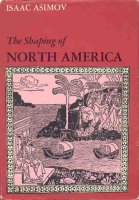
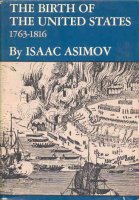
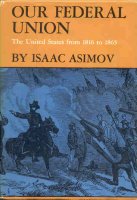
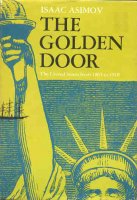
The Shaping of North America: From Earliest Times to 1763 by Isaac Asimov (Dobson, 1973)
The Birth of the United States: 1763 - 1816 by Isaac Asimov (Dobson, 1974)
Our Federal Union: The United States from 1816 to 1865 by Isaac Asimov (Dobson, 1975)
The Golden Door: The United States from 1865 to 1918 by Isaac Asimov (Dobson, 1977)
Isaac Asimov has always been one of my favorite writers, particularly of science fiction. As a child, I preferred my science fiction "hard"—with lots of plausible science and minimal fantasy—and Asimov, a biochemist, could always be counted on.
Later, I discovered his factual science writing, which if not as exciting was equally well-written and almost as compelling. I found that Asimov could expound on almost any topic, making it both interesting and understandable to the intelligent layman. It was with this in mind that I purchased, soon after they were first published, this series of books on American history. I knew even then that studying history was important, and I hoped that my favorite science writer could undo my school experience and make the subject interesting to me.
Alas, it was only time that finally healed that wound, and these books languished on my shelves for decades. I now find the study of history to be, not only important, but essential—especially in these days when ignorance and disregard of history appear to be growing exponentially. At last, I pulled Asimov's books down from the shelf, hoping for both my own edification and some history books I could recommend for our grandchildren.
The first goal was accomplished easily enough. I'm still impressed with Asimov's ability to start from the beginning and explain the basics of a subject without being condescending, a skill absolutly critical when appealing to bright young minds, and at which so many fail absymally when attempting to write for children.
I was so excited by the books that the only thing that kept me from passing them on immediately to our oldest grandchild was the desire to determine whether or not the author's autograph made the first book too valuable for casual use: To Linda, Isaac Asimov, 25 Sep '81. His comment at the time was, "I don't often get asked to autograph this series." True, the occasion was a gathering of science fiction enthusiasts, but of all the Asimov books I owned, these were the only ones I had in hardcover.
Sadly, no series has so failed of its promise to me since Harry Potter, which I felt peaked at the third or fourth book then went downhill dramatically. I waxed enthusiastic about these history books while I was still in the process of reading them (see How Far Have We Come in 200 Years? and The Art of Writing History). At the time, I wrote, "I highly recommend [this series] despite some obvious biases on the author's part (fairly mild, and unavoidable; that's why we need to read history from several sources). I still recommend it, but with serious qualifications.
Asimov's writing is interesting throughout, and he covers a lot of ground with almost as much thoroughness as could be expected from so broad a survey. I especially enjoyed his explanations of the historical origins of many common words and expressions, such as throwing one's hat in the ring, and gerrymandering.
However, as the series progressed, those author biases grew from mild to—well, perhaps not "Thai hot," but certainly too hot for my taste. When I said Asimov writes without condescension, that was not entirely correct. Of the merely ignorant he is respectful; but of those who disagree with his political and social viewpoints, not so much. For example, when he says of Grover Cleveland that "although a bachelor, he indulged in female company"—the kind of indulgence that resulted in an illegitimate child—he makes sure to add, "To expect anything else would have been ridiculous." A few such gratuitous insults are easily passed over, but as they grew numerous, with the political commentary more and more heavy-handed, reading became tedious.
I'm sorry to say that the series also fails of one more promise, the final sentence of the last book: How that came about will have to be the story of the next volume of this history of the United States. If Asimov ever wrote the final volumes of his series, I have yet to find them. It stops abruptly after World War I.
My recommendation has gone from wildly enthusiastic to lukewarm. These are useful histories, as long as one keeps in mind that they're told from a restricted viewpoint. I'm still looking for authors who can write compelling narratives without including a heavy bias in favor of themselves as the ultimate source of wisdom.
I suppose writing a history book is like making a sculpture: the art comes from choosing what to leave out. And critics will always quarrel with your choices.
I've mentioned recently how much I'm enjoying Isaac Asimov's four-part book series on American history. The fact that it was written in the early to mid-1970's I have not found to be a hindrance; indeed, I appreciate that he does not write with the stridency I'm accustomed to from modern commentators on our history. His language sometimes reveals that these are older books—using the term "Indian" rather than "Native American," for example—but he uses what was considered right at the time, and can't be held responsible for our subsequent preferences.
As I finished the section on Andrew Jackson, however, I realized with a shock that Asimov had omitted a term that could not be left out of a history of Jackson's administration today: the Trail of Tears.
In Jackson's administration, the long martyrdom of the Indians reached a new stage. By now, the Indians remaining in the various states of the Union were, for the most part, helpless before the organized power of the White Man. They could no longer fight wars; they could only appeal to the courts.
When gold was discovered in Georgia on land which had been assigned to the Cherokee tribe, the White Man moved in, and the treaties with the Indians were torn up as casually and as callously as were all such treaties both before and after. The Indians sued and the case went to the Supreme Court. Eventually, old John Marshall decided that it was the federal government that ruled over Indian territories, and that Georgia's laws against the Cherokees were unconstitutional.
Georgia defied the judgment and Jackson refused to do anything about it. That old Indian-fighter was not in office to uphold the Red Man against the White Man. He is reported to have said, "John Marshall has made his decision, now let him enforce it!"
Indeed, what Jackson pushed for was the gradual and complete transfer of all Indians to lands west of the Mississippi. This was accomplished, gradually, but not entirely peacefully. [Emphasis mine.]
Asimov goes on to describe briefly the Black Hawk War, and the Seminole Wars, that came about as part of the process, but of the long, deadly march represented by the highlighted sentence, he says nothing. For what it's worth, according to Google Book Ngram Viewer, the use of the term "Trail of Tears" peaked in 1995.
Of all the things Asimov does not cover—in a history book one must always leave out most of what happened—this is the first that really caused me to sit up and take notice. (No, I take that back. In the first book of the series, I was surprised that he doesn't mention the Battle of Saratoga as the "Turning Point of the Revolution." He mentions the battle, and that it was a turning point, but growing up in Upstate New York, not far from Saratoga, its designation at the turning point was emphasized—it's one of the few things I remember from my history classes.)
This discovery does not sour me in any way against Asimov's books, but merely reinforces the idea that history must be approached from several angles and through many sources.
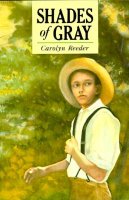
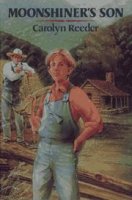
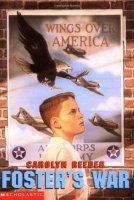
Shades of Gray by Carolyn Reeder (MacMillan, 1989)
Moonshiner's Son by Carolyn Reeder (MacMillan, 1993)
Foster's War by Carolyn Reeder (MacMillan, 1998)
My oldest grandson recommended Shades of Gray to his mother, who recommended it to me; now I'm recommending it to you. Jonathan eats dense, thousand-page books for breakfast, so this 152-page historical novel must have been no more than a gulp for him, but I'm glad to say that he—like his mother and grandmother—is not too proud to enjoy a good book at any level. These three books are all our library has to offer of Reeder's many offerings.
Shades of Gray is a tale of post-Civil War Virginia, told with sensitivity and, as far as I can tell, historical accuracy. There are difficult moments, and times of courage; of returning good for evil, and standing up for one's beliefs, and recognizing the humanity of someone with whom one disagrees. For all this good edcational value, it's also a great story.
Moonshiner's Son is likewise, and gives a whole new appreciation for Appalachian Mountain culture and several sides of our country's well-meaning, but foolish, experiment with Prohibition.
About Foster's War I can't be so enthusiastic, perhaps because I read it last, but more because it is by far the darkest of the three. Again, there are good moments and bad, and a sensitive treatment of the challenges faced by families living in Southern California at the start of World War II. But it's grim.
Although in all three cases the main character is a boy, I can commend the author for the strong female characters she also includes. What distresses me is my suspicion that she may be working out problems she has had with men in her own life. Three books; three boys afraid of the father or father-figure in their lives, and desperately seeking approval. In Foster's War, the father is downright abusive to his whole family, which tiptoes around trying to avoid "setting him off." Plus, in that book there's a lot more of what I don't like about so many modern children's books: disrespect between siblings, and from older children to younger.
I do like that in Foster's War the author does not eschew the language that was common in that era, e.g. referring to the enemy as "Japs," but merely includes a note that that was then, this is now, and the term is now considered insulting—though I did note that she neglected to make the same explanation about "Krauts," referring to the Germans.
Random question: Why is it that books with content only appropriate for older children are written with such a low reading level?
Shade of Gray and Moonshiner's Son I recommend enthusiastically; Foster's War with qualifications.
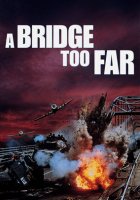 A Bridge Too Far (the 1977 movie)
A Bridge Too Far (the 1977 movie)
I've seen the movie before, and read the book—but a long, long time ago. Since we are planning a visit to Arnhem—the place of the bridge that was, tragically, "too far"—it seemed good to take another look at the scenery, and the story.
I'm no fan of war movies, but A Bridge Too Far is well done, and well told. It strikes a good balance, showing both criminal stupidities and heroic actions, deftly avoiding both the Scylla of lurid anti-war films and the Charybdis of sentimental patriotism.
I can't recommend it unreservedly, because of the language, but that's rare and at least reasonable for the situations. As for general content ... well, it's rated PG, but it's 'way too sad and intense for most of our grandchildren. That's too bad, because it's a good history lesson, and some of them will be joining us in Arnhem and will see where the events of World War II's Operation Market Garden took place. At least I can highly recommend that our children see A Bridge Too Far, if they can, and maybe the oldest grandson. Or two, I can't be sure. If one likes to read about fictional battles, as they do, maybe it's not so bad to see a bit of what real war is like.
March is a little late to be posting my Books Read list for 2017, but the time has slipped by. (Doesn't it always?)
Looking it over, I'm pleased with how well my reading was spread out over time this year. Only two months show fewer than four books: August and September, not coincidentally the months of vacation and family reunion. At one stage of my life, vacations were a time for reading; now they are filled with grandchldren, travel, or both. I read the most books (10) in June, which had more variety in terms of genre than December, its close competitor (9).
My reading for 2017 reflects three reading projects: Dorothy Sayers, J. R. R. Tolkien, and Miss Read (Dora Jessie Saint), plus a dip back into science fiction, the discovery of a new, enjoyable children's book author (N. D. Wilson), and two books written by friends (Blair Bancroft and Esther Moneysmith Gross). I missed my goal of reading the entire Bible this year, but did finish (and start anew) in February 2018. All in all, it was a good year.
Here's the alphabetical list; links are to reviews. Titles in bold I found particularly worthwhile. This chronological list has rankings and warnings as well.
- 100 Cupboards by N. D. Wilson
- Boys of Blur by N. D. Wilson
- Brain on Fire by Susannah Cahalan
- Busman's Honeymoon by Dorothy Sayers
- The Christmas Mouse by Miss Read
- Citizen of the Galaxy by Robert Heinlein
- Cry, the Beloved Country by Alan Paton
- Daring Greatly by Brené Brown
- Deep Undercover by Jack Barsky
- Designed to Move by Joan Vernikos
- The Documents in the Case by Dorothy Sayers with Robert Eustace
- Dorothy L. Sayers: A Careless Rage for Life by David Coomes
- The Fall of Heaven by Andrew Scott Cooper
- Five Red Herrings by Dorothy Sayers
- Gaudy Night by Dorothy Sayers
- The Gifts of Imperfection by Brené Brown
- The Glorious Adventure by Richard Halliburton
- Hangman's Holiday by Dorothy Sayers
- Have His Carcase by Dorothy Sayers
- Have Space Suit—Will Travel by Robert Heinlein
- The Hobbit by J.R.R. Tolkien
- Hold On to Your Kids by Gordon Neufeld and Gabor Maté
- How I Killed Pluto and Why It Had It Coming by Mike Brown
- I Thought It Was Just Me (but it isn't) by Brené Brown
- In the Blood by Steve Robinson
- In the Teeth of the Evidence by Dorothy Sayers
- Ingathering by Zenna Henderson
- Jim Bridger: Mountain Man by Stanley Vestal
- The Last Archer by S. D. Smith
- The Last Queen of England by Steve Robinson
- Leepike Ridge by N. D. Wilson
- Like Living Among Scorpions by Jennifer Fulwiler
- The Lord of the Rings: The Fellowship of the Ring by J. R. R. Tolkien
- The Lord of the Rings: The Return of the King by J. R. R. Tolkien
- The Lord of the Rings: The Two Towers by J. R. R. Tolkien
- Lord Peter: The Complete Lord Peter Wimsey Stories by Dorothy Sayers
- The Master of Disguise by Antonio J. Mendez
- Miss Clare Remembers by Miss Read
- Murder Must Advertise by Dorothy Sayers
- The Nine Tailors by Dorothy Sayers
- No Holly for Miss Quinn by Miss Read
- The People: No Different Flesh by Zenna Henderson
- Outlaws of Time: The Legend of Sam Miracle by N. D. Wilson
- Over the Gate by Miss Read
- Pilgrimage: The Book of the People by Zenna Henderson
- Red Planet by Robert Heinlein
- Rising Strong by Brené Brown
- Rocket Ship Galileo by Robert Heinlein
- The Royal Road to Romance by Richard Halliburton
- The Shadow of Robbers' Roost by Helen Rushmore
- Shadowed Paradise by Blair Bancroft
- The Silmarillion by J.R.R. Tolkien
- Storm in the Village by Miss Read
- The Stranger in My Genes by Bill Griffeth
- Strong Poison by Dorothy Sayers
- Tangled Strands by Esther Moneysmith Gross
- To the Grave by Steve Robinson
- The Tolkien Reader by J.R.R. Tolkien
- The Unpleasantness at the Bellona Club by Dorothy Sayers
- Village Christmas by Miss Read (read twice)
- Village Diary by Miss Read
- Village School by Miss Read
- The Whimsical Christian by Dorothy Sayers
Ember Rising, the latest in S. D. Smith's Green Ember series, is now available! I have just completed a delicious re-read of all the previous books—The Green Ember, The Black Star of Kingston, Ember Falls, and The Last Archer—and am almost halfway through my advance copy of Ember Rising. It was hard to wait patiently to read the new book, but worthwhile to get the old stories clear in my head again. (I am not like J. R. R. Tolkien, for whom there was only one "first reading" of a book. I read voraciously, and I read fast—but I forget quickly, too, and don't really remember a book until I've read it several times.)
So, any of you Green Ember fans who didn't get advance copies, now's your chance! Here's the link at S. D. Smith's store, and here's Amazon's.
TODAY, Februay 7, you can get the first two Green Ember books in Kindle format for FREE. Enjoy!
Permalink | Read 1983 times | Comments (0)
Category Reviews: [first] [previous] [next] [newest] Education: [first] [previous] [next] [newest] Children & Family Issues: [first] [previous] [next] [newest] Everyday Life: [first] [previous] [next] [newest]


